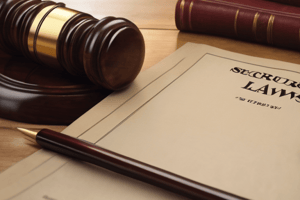Podcast
Questions and Answers
What is the main purpose of regulations?
What is the main purpose of regulations?
- Enforcing laws
- Establishing standards (correct)
- Promoting corruption
- Creating chaos
Which type of regulation provides detailed guidance on applying statutes?
Which type of regulation provides detailed guidance on applying statutes?
- Policies
- Statutes
- Rules (correct)
- Legislations
Why are regulations important for consumers?
Why are regulations important for consumers?
- To exploit natural resources
- To create substandard treatments
- To ensure minimum quality and safety standards (correct)
- To promote harmful products
Who issues statutes?
Who issues statutes?
Which regulatory action helps in preventing damage to the environment?
Which regulatory action helps in preventing damage to the environment?
What is the difference between statutes and regulations?
What is the difference between statutes and regulations?
What is the purpose of regulations aimed at preventing monopolistic behavior?
What is the purpose of regulations aimed at preventing monopolistic behavior?
How do regulations help in promoting transparency and accountability?
How do regulations help in promoting transparency and accountability?
Why might businesses sometimes view regulations as burdensome?
Why might businesses sometimes view regulations as burdensome?
What is one of the drawbacks that businesses may face when complying with regulations?
What is one of the drawbacks that businesses may face when complying with regulations?
How do regulations contribute to a balance between private interests and public welfare?
How do regulations contribute to a balance between private interests and public welfare?
Flashcards are hidden until you start studying
Study Notes
Understanding Regulations
In today's complex business environment, regulations play a crucial role in determining how companies operate. Regulations are formal, binding rules established by governmental agencies or commissions. They serve to maintain order, establish standards, promote fairness, and ensure the protection of various parties involved.
Types of Regulations
There are two main types of regulations:
-
Statutes: These are laws passed by legislative bodies like the US Congress or state legislatures. They cover broad policy objectives and principles, forming the foundation of a country's legal system.
-
Regulations: Also known as rules or administrative regulations, these documents are issued by government agencies to implement and enforce the provisions of statutes. They provide more detailed, practical guidance on how to apply the statutes in real-world situations.
Each type of regulation serves unique purposes and requires different levels of effort to comply with them.
Importance of Regulations
Regulations are important for several reasons:
-
Protecting Consumers: Regulations ensure that businesses provide goods and services that meet minimum quality and safety standards. This safeguards consumers from potentially harmful products or substandard treatments.
-
Safeguarding the Environment: Regulations help prevent the exploitation of natural resources and protect the environment from damage caused by industrial activities. Examples include air pollution control rules and those governing hazardous waste disposal.
-
Encouraging Competition: Regulations aimed at preventing monopolistic behavior encourage a level playing field for businesses, allowing smaller companies to compete effectively.
-
Promoting Fair Play: Through regulations, governments seek to eliminate unfair business practices such as false advertising.
-
Establishing a Framework for Good Governance: Regulations lay down guidelines and requirements for official conduct, ensuring transparency and accountability.
Despite their benefits, regulations can sometimes be viewed as burdensome by businesses, particularly when they require significant time, effort, and resources to comply with. Nevertheless, the overall goal is to foster a conducive environment where businesses thrive while maintaining a balance between private interests and public welfare.
Studying That Suits You
Use AI to generate personalized quizzes and flashcards to suit your learning preferences.




